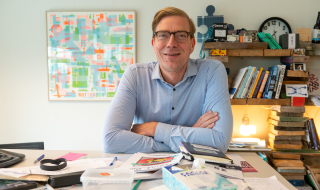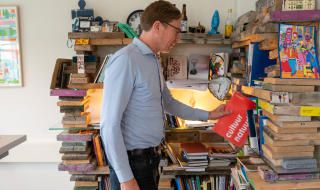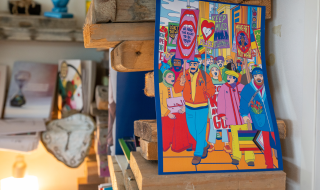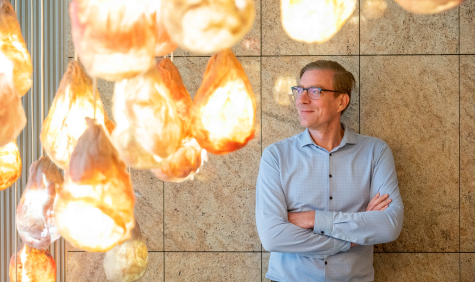"You can't organise the revolution, but you can plant seeds"
Revolutionary thinking at Erasmus University
Derk Loorbach is the leading authority on transitions: major and substantial changes in society. As professor of transition management, he leads a group of do-gooders with its own business enterprise.
Typical rebellion?
Imagine: your father is dean of the Bar Association and chef de mission of an Olympic team. What do your student days look like then?
For Derk Loorbach, it was squatting, taking part in demonstrations, and performing with a band. And studying, but in his case, innovative, problem-based education in Maastricht.
Typical rebellion, you might think. But the contradiction is false, according to Loorbach: "It was actually my parents who taught me a lot of social engagement! And intellectual curiosity.”
Stumbling forward
Such a paradox can also be seen in Loorbach's academic career. He's still campaigning: he wants to improve the world with his work. But he does so in Rotterdam, at the most business-minded university in the country.
It is fitting, then, that his research group is incorporated in a business enterprise called DRIFT, under the holding company of Erasmus University. Loorbach and his idealists thus have to earn their own living with contract research. "The discipline of the market, yes. But we know how to capitalise on the transition questions in society. DRIFT now has almost forty employees, including four PhD students. I'm quite proud of that! This club feels like my baby."

"What are we stuck in now, and where do we want to go?"
Over the past 12 years, DRIFT has developed into a niche within the science and education system. "We actually have a kind of social science business model, combining academic research with all kinds of education – including for professionals – plus advisory work and activism on sustainability."
In the process, DRIFT has been a source of new terms, such as stumbling forward, topplers, X-curve and - last but not least - Ministry of Demolition.
Transition arena
Everything in Loorbach's work revolves around transitions. What are they? "Systemic changes. Fundamental long-term changes."
The trick is to recognise them and steer them as smoothly as possible in a desired direction. Sustainability is a good example, says Loorbach. "At some point, people start to realise that we have to adapt. Even Shell is saying that by now. But those adjustments are usually superficial. You buy some time with it, but at the same time you dig yourself in deeper and delay structural change even further."
Loorbach's transition approach can be characterised as revolutionary thinking about evolutionary developments. "You gather key actors together and zoom out, that is, look at the longer term: what are we stuck in now, and where do we want to go?"
Actually, this is not substantially different from the problem-based education he received at Maastricht. "People bring their own background, their own knowledge and their own feelings. But by looking at a complex problem together, a new common discourse or idea or image actually emerges in such a group. If you organise that well, and people internalise it, it also changes their behaviour on a day-to-day basis."
"This is what we have come to call the transition arena. And that includes short-term experimentation or negotiation. Because you can't organise the revolution, but you can plant seeds.”
Educational innovation
Unsurprisingly, Loorbach has strong ideas about the future of higher education. Indeed, in 2021, DRIFT produced a transition agenda for higher education: Learning to Digitise.
"The economist Schumpeter once said: every transition is ultimately a new combination. In this case, there is educational innovation – such as problem-based learning – on the one hand, and digitisation on the other."

"Digitization opens a world of knowledge for students"
"Like sustainability, digitisation is a change in our environment. We can have all kinds of opinions about it, but we cannot deny it. Digitalisation is advancing, impacting social systems such as higher education."
"Then, though, the question is: if this digitisation is going to lead to all kinds of structural changes, what do we wish for? What innovations do we want in higher education, and how does digitisation play a role? I very much hope that those two elements will come together.”
Watch out
For Loorbach himself, digitisation is the key to an inclusive and transformative higher education. "It opens up a world of knowledge for students. In addition, it can make learning paths much more personal."
But this first requires a vision for this transition. "If we are not careful, enthusiasts will get busy trying to digitise everything as much as possible. That could actually make the problems worse: the massification and efficiency thinking. Because digitisation can also lead to even fewer teacher contact hours, even more control systems and even more standardisation. As a result, everyone's stress increases even further and what is learned becomes even less valuable. You can already see the signs of that here and there."

"My parents instilled in me a great sense of social engagement."
Loorbach also warns against overshooting in educational innovation. "There is a lot of value in the old system, which has been built on for centuries. I'm glad there are just doctors and engineers. Maybe even economists are still useful! And a good lecturer can greatly inspire hundreds of people at once with his lectures. But after that, those people must be given the chance to develop individually."
More direction
SURF cannot be ignored in educational innovation, Loorbach believes. "First of all, it is a very important platform to ensure that everyone can keep up with digitalisation. But that is still mainly a facilitating role. Fortunately, in recent years I also see SURF thinking more strategically about where we need to go."
"From my transition vision, I think they could well give more direction, for example by developing or testing solutions. After all, SURF as a cooperative is the platform for digitisation in higher education. There, the institutions can learn from and with each other."
Further reading:
Derk Loorbach & Julia Wittmayer: Transforming universities - Mobilising research and education for sustainability transitions at Erasmus University Rotterdam, The Netherlands
Text: Aad van de Wijngaart
Photos: Sicco van Grieken
